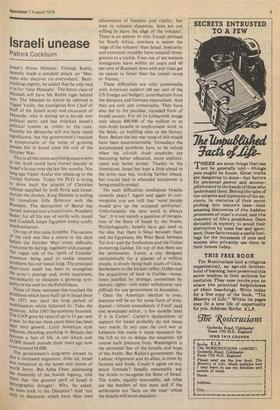Israeli unease
Patrick Cockburn
Israel's Prime Minister, Yitzhak Rabin, recently made a petulant attack on 'Messiahs who discover rot everywhere'. Backtracking slightly, he added that he only had It in for 'false Messiahs'. The better class of Messiah will have Mr Rabin right behind him. The Messiah to whom he referred is Yigael Yadin, the prestigious first Chief of Staff of the Israeli army and excavator of Massada, who is setting up adovish new Political party and has attacked Israel's Political system as rotten to the core. Possibly his demarche will not have much significance, but the government's reaction IS symptomatic of the sense of growing unease felt in Israel since the end of the October War.
This is all the more surprising since events in the Arab world have moved sharply in Israel's favour over the last few months. Not long ago Yassir Arafat was speaking to the United Nations. Today the PLO is trying to drive back the attacks of Christian militias supplied by both Syria and Israel. Across the Jordan, King Hussein is ending his tremulous little flirtation with the Russians. The destruction of Beirut has turned Amman into a boom town. President Sadat, for all his war of words with Assad and Gaddafi, keeps Egyptian policy coolly unadventurous.
On top of this came Entebbe. The success of the raid was like a return to the days before the October War: every difficulty overcome by daring, ingenuity and courage. Yet vague talk of the 'spirit of Entebbe' somehow being used to tackle internal Problems has not lasted long. The principal short-term result has been to strengthen the army's prestige and, more important, momentarily to dissipate a growing symPathy in the west for the Palestinians.
None of these successes has touched the Problems which have built up in Israel since the 1973 war (and the long period of Mobilisation which followed it). Take the economy. After 1967 the economy boomed. The GNP grew by rates of up to 11 per cent a Year. In the last three years there has been near zero growth. Latin American style inflation, dwarfing anything in Britain, has become a fact of life. A car which cost 35,000 Israeli pounds three years ago now costs around 94,000.
The government's long-term answer to this is increased migration. After all, Israel Was conceived as the home and centre of World Jewry. But Abba [ban, addressing the Assembly of the Jewish Agency, told them that 'the greatest peril of Israel is demographic drought'. Why, he asked, do Jews stick to the Diaspora ? And 'not (MIY to diasporas which have their own allurements of freedom and vitality, but even to volcanic diasporas. Jews are not willing to leave the edge of the volcano'. There is an answer to this. Except perhaps for South Africa, nowhere is nearer the 'edge of the volcano' than Israel. Insecurity and economic troubles have reduced immigration to a trickle. Four out of ten western immigrants leave within six years and 60 per cent of Russians Jews with exit visas get no nearer to Israel than the transit camp in Vienna.
These difficulties are only containable with American support (40 per cent of the US foreign aid budget), contributions from the diaspora and German reparations. And they are only just containable. They have also led to the peculiar, lopsided form of Israeli society. For all its kibbutznik image only about 400,000 of the million or so non-Arab Israelis in employment work in the fields, on building sites or the factory floor. Before the last war none of this would have been insurmountable. Nowadays the accumulated problems have to be solved when the oil-rich Arab countries are becoming better educated, more sophisticated and better armed. Thanks to the Americans, Israel has kept a little ahead in the arms race but, looking further ahead, her crucial lead in educated manpower is being steadily eroded.
Do such difficulties predispose Israelis towards peace? Again and again in conversation you are told that 'most people would give up the occupied territories'. Unfortunately the next word is always 'but'. It is not merely a question of recognition of the State of Israel by the Arabs. Psychologically, Israelis have got used to the idea that there is Sinai between them and the Egyptians, the West Bank between Tel Aviv and the Jordanians and the Golan protecting Galilee. On top of this there are the settlements. Yamit, a city designed optimistically for a quarter of a million people, is slowly being built south of Gaza. Settlements in the Jordan valley, Golan and the acquisition of land in Galilee—sometimes justified by strategy, sometimes by historic rights—will make withdrawal very difficult for any government in Jerusalem.
Once the American election is over, pressure will be on for some form of withdrawal—`almost immediately if Ford', said one newspaper editor, 'a few months later if it is Carter'. Carter's declarations of support for Israel probably do not mean very much. In any case the civil war in Lebanon has made it more necessary for the US to try to defuse the situation. Of course such pressure from Washington is the perennial fear of the Israelis and hope of the Arabs. But Rabin's government, the Labour Alignment and its allies, is riven by factions and feuds. Could it agree on any peace formula? Israelis reasonably ask the Arabs to recognise the State of Israel. The Arabs, equally reasonably, ask what are the borders of this state and if the settlements are 'facts on the map' which the Israelis will never abandon.


























 Previous page
Previous page